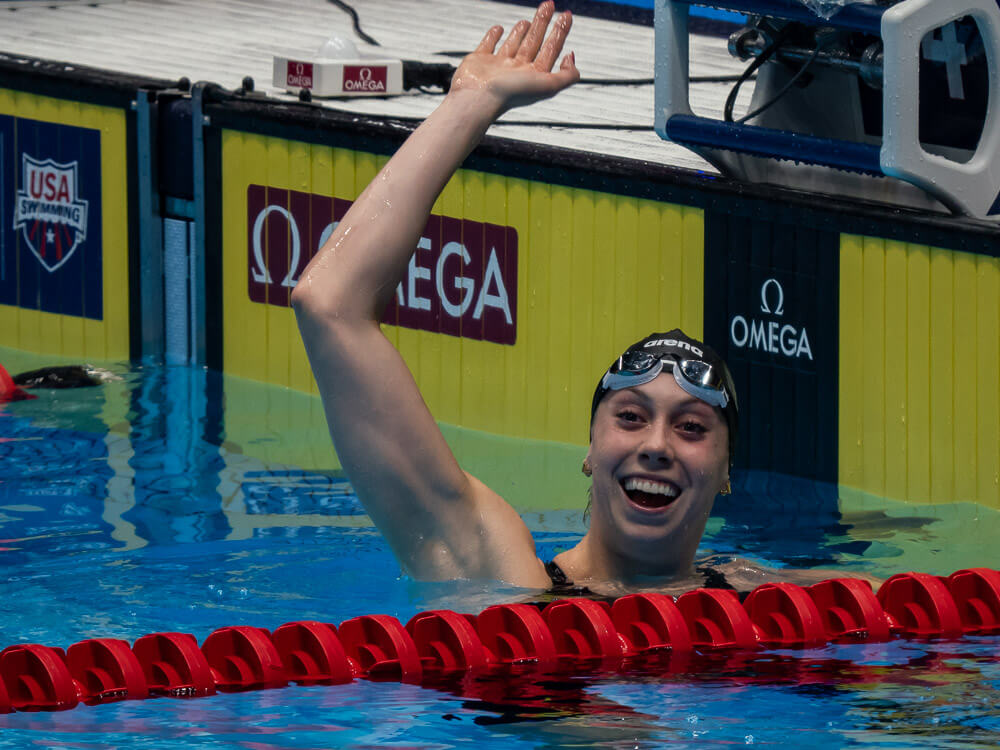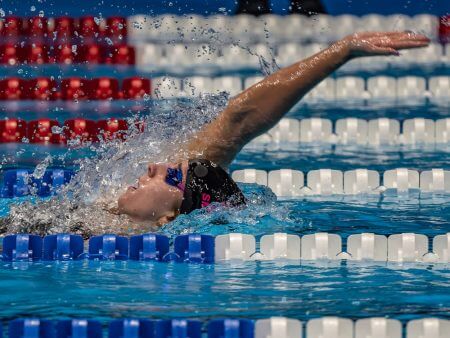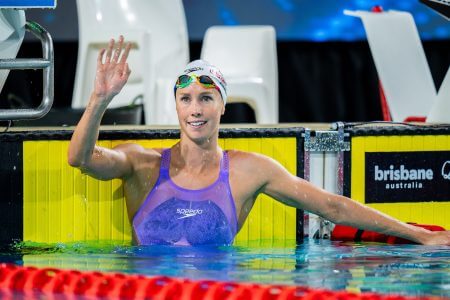Olympic Relay Analysis: World-Record Breakers Give American Women a Medley Relay Advantage (Composite Times Included)

Olympic Relay Analysis: World-Record Breakers Give American Women a Medley Relay Advantage
Three years ago at the Tokyo Olympics, the U.S. women were gunning for a relay win in their final chance, the 400 medley relay, but Cate Campbell out-swam American anchor Abbey Weitzeil to get to the wall 13-hundredths ahead and claim gold. In 2024, however, the race sets up that no one should be within striking distance of the United States by the time the freestylers enter the water.
That’s because the U.S. is set to deploy the world-record holders in the 100 backstroke, 100 breaststroke and 100 butterfly on the first three legs. The American men had the same advantage for a stretch two decades ago with Aaron Peirsol, Brendan Hansen and Ian Crocker, and sure enough, no one could touch that group. Now, Regan Smith, Lilly King and Gretchen Walsh could give their team a similarly insurmountable lead in the final women’s race of the Paris Games.

Regan Smith — Photo Courtesy: Peter H. Bick
At the U.S. Olympic Trials, Smith swam a time of 57.13 in the 100 back to lower the previous world record held by Australia’s Kaylee McKeown. It has been seven years since King, now 27, clocked 1:04.13 for the world mark in the 100 breast, but she remains among the world’s elite in the event, her time of 1:05.43 from U.S. Trials currently ranked fourth in the world.
On fly, the Americans will likely use Walsh, who clocked 55.18 in Indianapolis to break Sarah Sjostrom’s eight-year-old world record of 55.48. But should Walsh falter at her first Olympics, there is a more-than-adequate second option in Torri Huske, the 2022 world champion who exceeded her previous American record at Trials with a time of 55.52, moving to No. 3 all-time in the event. Finally, Kate Douglass is the likely anchor for this team, having clocked 52.56 to win the 100 free at Trials. Douglass also swam fast as 51.79 on a relay split in 2023.
Considering only times achieved thus far in 2024, the U.S. composite relay adds up to 3:50.30, under the existing world record of 3:50.40 set by Smith, King, Kelsi Dahlia and Simone Manuel in 2019. Add in relay exchanges, and the potential exists for the Americans to get under 3:50 for the first time.
Traditionally, the biggest challenger to the U.S. has been Australia, a team with extremely strong bookends in McKeown and Mollie O’Callaghan. McKeown has been as fast as 57.41 this year, just missing her existing world record of 57.33 at the Australian Trials, and by the time this relay rolls around on the last day of the Olympics, McKeown could have reclaimed the mark from Smith. O’Callaghan, meanwhile, is the two-time world champion in the 100 free and favorite to win Olympic gold in the event.

Emma McKeon — Photo Courtesy: Wade Brennan (Wade’s Photos)
Emma McKeon, 30, is still a reliable relay swimmer and a strong butterfly leg for Australia, but breaststroke is the big concern for this team. In Tokyo, the main reason Australia managed to win gold was Chelsea Hodges swimming a full second quicker than her individual best time on the breaststroke leg. In Paris, Australia’s breaststroke options are Jenna Strauch and Ella Ramsay, both of whom swam 1:06.9 at Trials. Unless one of them makes a huge jump at the Olympics, that is a tough deficit to overcome.
On the contrary, China could jump the Aussies and move into silver-medal position because of the breaststroke leg. Tang Qianting is currently the favorite to win Olympic gold in the 100 breast after clocking 1:04.39 earlier this year, and China has reigning world champion Zhang Yufei set to swim butterfly. Yang Junxuan set a 100 freestyle national record of 52.68 earlier this year. But China could have a huge gap to make up on backstroke. Wan Letian is the country’s best option this year at 59.02, almost two seconds slower than Smith and McKeown.
Canada is the final medal contender, with Kylie Masse returning to the 57-club in the 100 backstroke at her country’s Trials earlier this year and defending Olympic gold medalist Maggie Mac Neil likely to handle butterfly. A sub-53 split on the anchor leg, where veteran Penny Oleksiak and teenage star Summer McIntosh are the top options, could allow Canada to steal a medal away from one of the favorites.
Here are the top composite relays based on 2024 times only:
United States: 57.13 + 1:05.43 + 55.18 + 52.56 = 3:50.30
China: 59.02 + 1:04.39 + 56.36 + 52.68 = 3:52.45
Australia: 57.41 + 1:06.90 + 56.58 + 52.33 = 3:53.22
Canada: 57.94 + 1:06.66 + 56.54 + 53.66 = 3:54.80
By day nine of the Olympics, expect each of these relays to feature swimmers who have captured individual medals in their respective 100-meter events. But if the Americans swim close to their times from Trials, they will be nearly impossible to beat, with a world record very much within reach.
More Olympic Relay Analysis:

- EVENT PAGE
- SCHEDULE
- VENUE
- STREAMING INFO
- DAY 1 PRELIMS RESULTS
- DAY 1 FINALS RESULTS
- DAY 2 PRELIMS RESULTS
- DAY 2 FINALS RESULTS
- DAY 3 PRELIMS RESULTS
- DAY 3 FINALS RESULTS
- DAY 4 PRELIMS RESULTS
- DAY 4 FINALS RESULTS
- DAY 5 PRELIMS RESULTS
- DAY 5 FINALS RESULTS
- DAY 6 PRELIMS RESULTS
- DAY 6 FINALS RESULTS
- DAY 7 PRELIMS RESULTS
- DAY 7 FINALS RESULTS
- DAY 8 PRELIMS RESULTS
- DAY 8 FINALS RESULTS
- DAY 9 FINALS RESULTS




Obviously this one is the USA ‘ s to lose. Just like GB in the Men’s 4×200m Freestyle Relay and the Aussie girls in the corresponding event, they’d all have to be DQ’d to be beaten!
This relay is probably the easiest to predict and win for the Americans after the composite Trials times
This seems like an absolute slam dunk. USA had a good lead on Aus before Tokyo as well but this lead is way bigger.
About 3 seconds,so 6ish metres (7 yards).